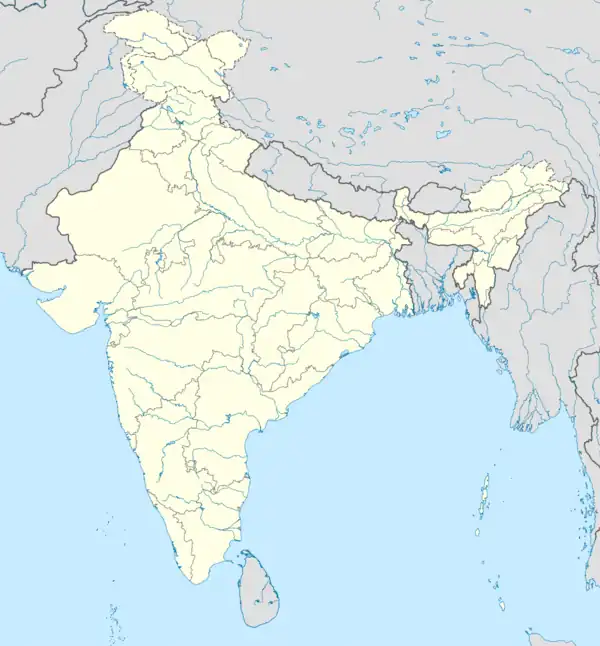Singtam Tea Garden
Singtam Tea Garden (also spelled Singtom) is a census town in the Darjeeling Pulbazar CD block in the Darjeeling Sadar subdivision of the Darjeeling district in the state of West Bengal, India.
Singtam Tea Garden | |
|---|---|
Census Town | |
 Singtam Tea Garden Location in West Bengal, India  Singtam Tea Garden Singtam Tea Garden (India) | |
| Coordinates: 27.0552°N 88.2288°E | |
| Country | |
| State | West Bengal |
| District | Darjeeling |
| Area | |
| • Total | 5.9975 km2 (2.3156 sq mi) |
| Population (2011) | |
| • Total | 5,792 |
| • Density | 970/km2 (2,500/sq mi) |
| Time zone | UTC+5:30 (IST) |
| PIN | 734102 |
| Telephone/STD code | 0354 |
| Lok Sabha constituency | Darjeeling |
| Vidhan Sabha constituency | Darjeeling |
| Website | darjeeling |
Geography
CT: census town, R: rural/ urban centre, N: neighbourhood, H: hill centre, NP: national park/ wildlife sanctuary, TE: tea estate, TA: tourist attraction
Abbreviations used in names – TG for Tea Garden (town/village), TE for Tea Estate
Owing to space constraints in the small map, the actual locations in a larger map may vary slightly
Location
Singtam Tea Garden is located at 27.0552°N 88.2288°E.
Area overview
The map alongside shows the northern portion of the Darjeeling Himalayan hill region. Kangchenjunga, which rises with an elevation of 8,586 metres (28,169 ft) is located further north of the area shown.[1] Sandakphu, rising to a height of 3,665 metres (12,024 ft), on the Singalila Ridge, is the highest point in West Bengal.[2] In Darjeeling Sadar subdivision 61% of the total population lives in the rural areas and 39% of the population lives in the urban areas.[3][4] There are 78 tea gardens/ estates (the figure varies slightly according to different sources), producing and largely exporting Darjeeling tea in the district. It engages a large proportion of the population directly/ indirectly.[5] Some tea gardens were identified in the 2011 census as census towns or villages.[6] Such places are marked in the map as CT (census town) or R (rural/ urban centre). Specific tea estate pages are marked TE.
Note: The map alongside presents some of the notable locations in the subdivision. All places marked in the map are linked in the larger full screen map.
Demographics
According to the 2011 Census of India, Singtam Tea Garden had a total population of 5,792 of which 2,850 (49%) were males and 2,942 (51%) were females. There were 416 persons in the age range of 0 to 6 years. The total number of literate people in Singtam Tea Garden was 4,649 (80.27% of the population over 6 years).[7]
Infrastructure
According to the District Census Handbook 2011, Darjiling, Singtam Tea Garden covered an area of 5.9975 km2. Among the civic amenities, the protected water supply involved overhead tank and tap water from untreated sources. It had 1,182 domestic electric connections. Among the medical facilities it had 1 dispensary/ health centre. Among the educational facilities it had were 5 primary schools, 1 middle school, the nearest secondary and senior secondary school at Darjeeling 10 km away. It had 4 non-formal education centres (Sarba Siksha Abhiyan). Among the social, cultural and recreational facilities, it had 1 auditorium/ community hall. An important commodity it manufactured was tea.[8]
Singtam Tea Estate
Singtam Tea Estate, 6 km from Darjeeling, was established in 1852. It covers 263 hectares. It belongs to the Camelia Tea Group Private Limited.[9] According to another source, Singtam Tea Estate was set up in 1854 by a German priest, Joachim Stoelke. He also planted Darjeeling's oldest tea estate in 1852, at a nearby site called Steinthal.[10]
Tourism
Singtom Tea Estate & Resort, located inside Singtom Tea Estate/Garden, is claimed to the world's oldest tea-estate resort, built in 1854. It is one of the world's most famous plantation-centric boutique hotels. It hosts thousands of visitors each year, and is arguably the only such place in the world where you can get a luxury experience at an affordable price.[10]
References
- Gurung, H. & Shrestha, R. K. (1994). Nepal Himalaya Inventory. Kathmandu: Ministry of Tourism and Civil Aviation.
- "Sandakphu-Phalut Trek". Himalayan High. Retrieved 21 March 2020.
- "Darjeeling". District Profile - General Information. District administration. Retrieved 21 March 2020.
- "District Statistical Handbook 2013 Darjeeling". Tables 2.2, 2.4b. Department of Planning and Statistics, Government of West Bengal. Retrieved 21 March 2020.
- "Darjeeling Tea". District administration. Retrieved 21 March 2020.
- "2011 Census – Primary Census Abstract Data Tables". West Bengal – District-wise. Registrar General and Census Commissioner, India. Retrieved 21 March 2020.
- "2011 Census – Primary Census Abstract Data Tables". West Bengal – District-wise. Registrar General and Census Commissioner, India. Retrieved 28 February 2020.
- "District Census Handbook Darjiling, Census of India 2011, Series 20, Part XII A" (PDF). Section II Town Directory, Pages 419-422: Statement I: Status and Growth History, Pages 423; Statement II: Physical Aspects and Location of Towns, Pages 424-425; Statement III: Civic and other Amenities, Pages 426-427; Statement IV: Medical Facilities 2009, Pages 428-430 Statement V: Educational, Recreational and Cultural Facilities, Pages 431: Statement VI:Industry and Banking. Directorate of Census Operations V, West Bengal. Retrieved 26 February 2020.
- "Tea Garden Factory in Singtam gutted". Times of India, 20 July 2003. Retrieved 26 February 2020.
- "Singtom Tea Estate & Resort". STE&R. Retrieved 28 February 2020.